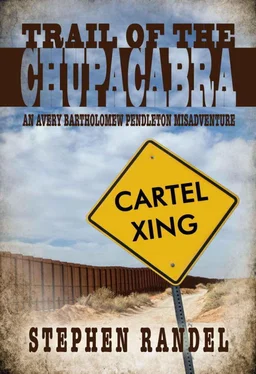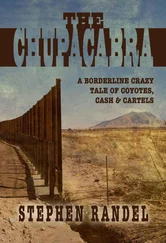“I know. I’m sorry. It was difficult.”
“I understand. The school bus was a mistake. But I promise you, Padre — I’ll never go back. I’ll die first.”
“You won’t ever go back. You have my word. I’ll protect you, my son. Come sit down with me.” After the two men took their seats, a short white-haired butler came from out of the villa.
“Padre,” the man began, “may I bring you some breakfast?”
“Yes, please.” The man turned and left. “That’s Antonio. He runs the house for me when I’m not here, which is most of the time.”
“Are you still sleeping in a different place every night?”
“Of course I am. One can only bribe so many people for protection.”
“Who was the man you were meeting with? I don’t know him.”
“He is my new communications director. Straight out of Silicon Valley.”
“Communications?” Carnicero asked.
“Yes, cell phone networks are too easy for the authorities to monitor these days. We still use the Internet for encrypted messages, but we’ve needed a better way to communicate deep in the field with our processing facilities and along the border when our shipments cross. Besides, the service coverage in the middle of the country is poor anyway. I don’t want to be surprised by the police or our rivals because our lookouts can’t get a signal.”
“How can that man help?”
“We’ve built our own encrypted radio network. All around our territories we’ve built a network of concealed radio towers with powerful antennas. They’re boosted by repeaters that extend our communication range deep into the desert and provide us with an early warning network for shipments in transit into the United States. Computers actually allow us to target specific radios that our men carry and skip over others so that our messages stay local, not broadcast across the country. It’s brilliant, and the best part is that anyone can buy the equipment.”
“It is brilliant, but it sounds expensive.”
“True, but it’s totally green. The towers are powered by solar panels.”
“So you’re an environmentalist now,” Carnicero laughed. “The times have changed, but the people seem to love you.” He motioned toward the speakers still playing the narcocorrido .
“Yes, the music. It’s Internet radio from just across the border in Texas. The Mexican government has banned the national stations from playing the narco-ballads, but people still clamor for them. Do they love me or fear me? I’m not so sure, but as long as they do what I say, I’m happy. But sometimes they must be reminded. Here, look at this.” The Padre pulled a yellow leaflet from a folder on the table and passed it over. Carnicero examined it. It was an antigovernment leaflet warning of the consequences of being an informant. Below the warning was a black and white picture of seven naked men hanging from their necks beneath an overpass. “I’m having a plane drop thousands of them over Monclova in a few days. Look at this,” he said as he pushed a newspaper across the table. “Turn to page three.”
“The article about Monclova?” Carnicero asked as he skimmed the story about an arson attack against a local ice-making company. The company’s facilities had been set on fire and more than a dozen of their trucks destroyed.
“They were cooperating with the authorities. Lending them trucks that the police used for undercover surveillance. I don’t understand it — I never even tried to extort money from the company.”
“So how’s business?” Carnicero asked as he put the newspaper down.
“Fantastic, for the most part. My latest passion is American quarter horses.”
“Quarter horses?” Carnicero laughed. “What do you know about horses?”
“The best have four legs, run fast, and crap a lot. Most importantly, they’re an excellent way to clean the money.”
“So you’re just buying them to launder the product proceeds?”
“And occasionally bet on them. My favorite horse just won a race with a million-dollar purse.”
“Is he a champion?”
“Not really, but when the jockeys know who is going to win, they can make more money at the betting window than at the finish line. So I let them in on it and strongly suggest they let my horses win. Elsewhere, we’ve been diversifying our product markets. America is still our biggest consumer, but Europe is growing rapidly. Overall, costs are down, prices are up, and even the other cartels have been quiet lately, maybe a little too quiet. I recently increased our security at all the facilities. Of course, with you back, security operations are now in your more than capable hands,” the Padre said as he lit a thin cigar.
“Thank you, Padre, but the other cartels would be crazy to go to war against you. You’ve never been stronger.”
“I know, but it pays to be cautious. The more we have, the more we have to lose,” he said as he blew a smoke ring into the air. “Also, there is one specific person that I’m concerned about.”
“One person? Who?”
“Do you remember Barquero?”
“The Ferryman? Of course, he brought in most of our weapons from the United States.”
“He used to. His last shipment was the largest one ever. Military hardware stolen from the U.S. National Guard. It was an inside job, beautifully planned, but we had a disagreement. Or maybe I just changed the terms of our bargain when he didn’t deliver them all the way and left me with the responsibility of moving the shipment across Mexico’s southern border and then all the way north. It was a pain in the ass. I lost several good men. Anyway, he was upset, and you don’t let a man like him wander around upset. His temper is as bad as yours. With you in prison, I sent my next best sicario , Sandro, to do the job.”
“Sandro is a very good hit man.”
“Was very good. Barquero killed him. Cut off his head.”
“That son of a whore!” Carnicero growled.
“Yes.”
“Where is he now?”
“Somewhere in Mexico. I had the weapons divided up and stored in different locations. He found one and destroyed it, along with some of our men. He blew up an entire block in the process.”
“He never was very subtle. He likes overkill.”
“The pot is calling the kettle black, no?” The Padre laughed.
“True.”
“Padre, your breakfast,” Antonio said as he placed a large platter of food and two china place settings from a large silver serving cart on the patio table.
“Thank you,” the Padre replied as he crushed out his cigar into a heavy Baccarat ashtray. “That will be all.”
“Padre,” Antonio said quietly, “there is one more thing. News from Veracruz.”
“Veracruz?”
“It’s about the freighter.”
“What about it? It should have sailed more than an hour ago.”
“There has been a problem with the ship, Padre,” Antonio said meekly.
“What kind of problem?” the Padre demanded.
“I’m sorry, but the ship has been sabotaged.”
“What do you mean, sabotaged?” the Padre asked angrily. “I paid a great deal of money to have it protected.”
“It was underwater explosives, Padre. It was a professional job. It happened early this morning. The ship and cargo are a total loss. Six of your men were onboard and couldn’t make it off. The authorities want to retrieve the bodies immediately.”
“Goddammit!” The Padre grabbed the heavy glass ashtray and threw it across the patio. It shattered to pieces as it hit the tile floor. “Leave us alone!” Antonio quickly retreated inside the villa. Two bodyguards on the third floor balcony overlooking the pool and gardens glanced nervously at each other after the Padre’s sudden outburst. “Barquero,” the Padre seethed.
Читать дальше











